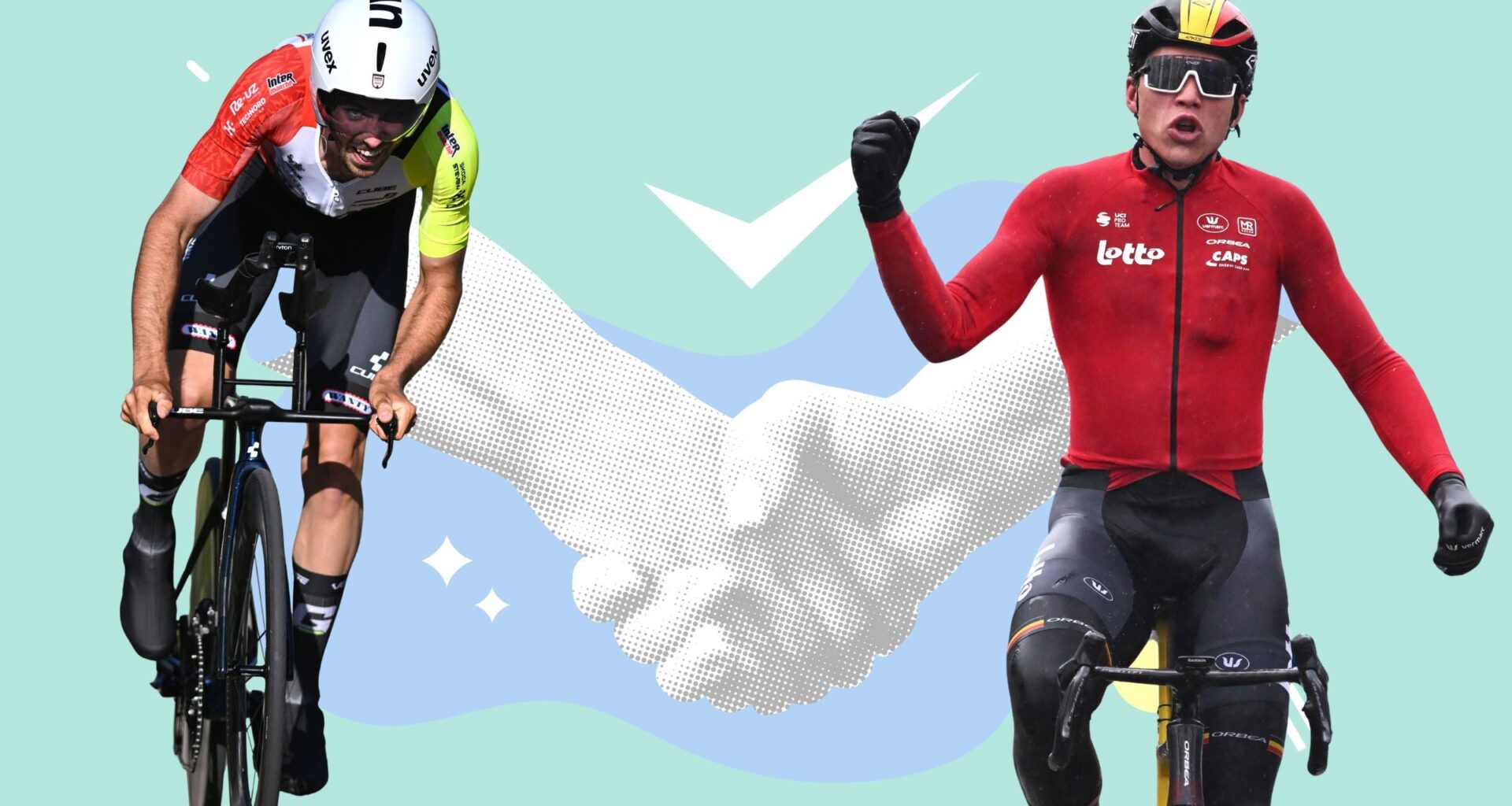Published November 8, 2025 06:59AM
Dozens of pros are facing unemployment as team mergers and closures turn 2025 into the worst transfer market in years.
At the center of cycling’s annual game of musical chairs are the messy, drawn-out talks between Lotto and Intermarché-Wanty, a complicated fusion that’s dragging deep into November and keeping riders, agents, and team staffers walking on eggshells.
The fallout doesn’t stop there. The collapse of Arkéa B&B Hotels dumped nearly 100 riders into the market going into this fall.
“Currently, about 60 to 70 riders are still looking for a place, while there are only a maximum of 8 to 10 vacancies,” Belgian rider agent Dries Smets told Sporza.
While some of that group have handshake deals or pending contracts yet to be made public, others are quietly retiring or stepping away.
The rest are in a holding pattern and are nervously waiting to see what breaks loose before the December 31 registration deadline.
The squeeze is sharpest at the lower end of the WorldTour food chain, where smaller-budget teams operate on thin margins and depend heavily on sponsorship renewals.
Today’s $50 million super teams — with outfits like UAE Emirates-XRG, Red Bull-Bora-Hansgrohe, and Lidl-Trek backed by deep-pocketed owner-operators — have all but locked in their rosters.
For everyone else, the slow-motion Lotto-Intermarché takeover has triggered a chain reaction that’s blocking the race futures of dozens of top pros.
Here’s where things stand and how the turbulent 2025-26 transfer season could leave an unprecedented number of riders on the sidelines.
Only 10 seats left in men’s WorldTour
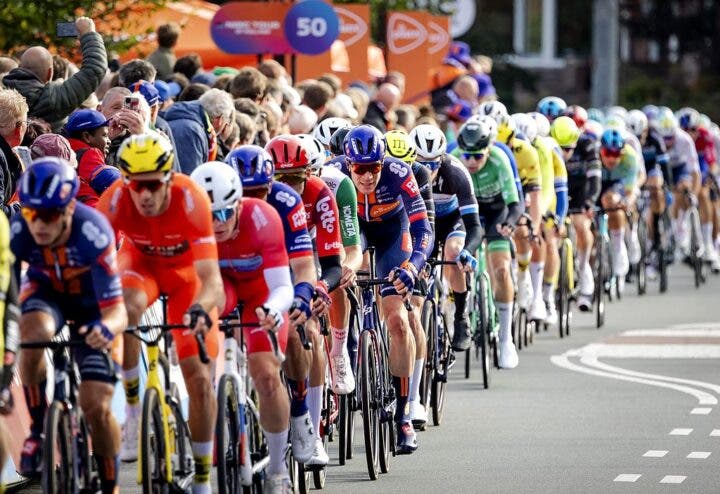 Dozens of riders could be left on the sidelines in this year’s contract crunch. (Photo: Getty Images/Velo)
Dozens of riders could be left on the sidelines in this year’s contract crunch. (Photo: Getty Images/Velo)
Right now, the rules of supply and demand tilt in favor of team owners.
According to Smets — whose portfolio includes riders like Ben O’Connor, Lotte Kopecky and Julian Alaphilippe — the ongoing merger talks, coupled with the closure of Arkéa B&B Hotels, see a double-whammy flood of desperate riders trying to find a contract.
“There is not only the merger, but a team like Arkéa-B&B is also stopping. So two of the 18 WorldTour teams are already closed. That means there are 60 fewer places available in the labor market, and that seriously increases the pressure,” Smets told Sporza.
By his count, 60 to 70 riders are still looking for contracts, while only eight to 10 roster slots remain open across the men’s WorldTour.
Riders who can’t stay in the WorldTour can often land contracts with ProTeam and third-tier squads. Typically, only a handful of pros, perhaps two to four riders, cannot find a contract at some level.
The worry this year is that the number could swell into the dozens.
Lotto-Intermarché merger: Slow and opaque
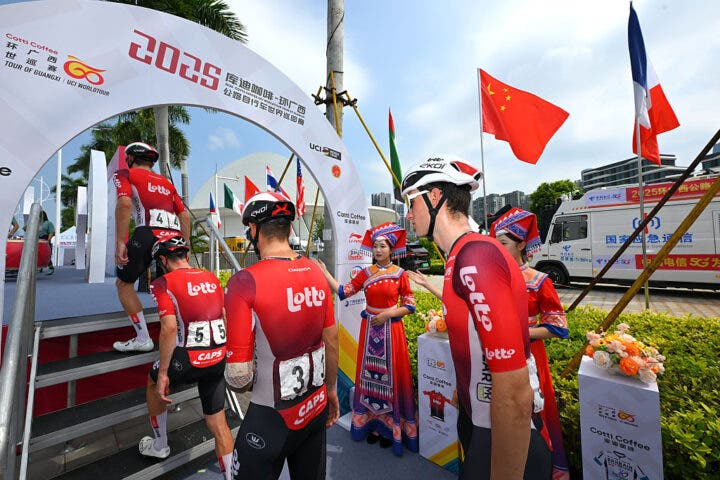 Dozens of riders are waiting for the outcome of merger talks. (Photo: Tim de Waele/Getty Images)
Dozens of riders are waiting for the outcome of merger talks. (Photo: Tim de Waele/Getty Images)
Much of the current unease rippling through the peloton traces back to the prolonged and opaque merger talks between Lotto and Intermarché-Wanty, two mid-tier WorldTour outfits attempting to fuse into a single squad for 2026.
One source told Velo the merger talks have locked down the rider market for months.
Board-room details remain sketchy on the talks that first appeared this summer, but it appears things are more complicated than expected.
Clearing the books of any debt or overdue payments is making what’s already a byzantine legal process even more challenging.
There’s still no official confirmation that the merger will even go through.
The working assumption inside the peloton is that the combined team will race under Lotto’s existing WorldTour license, since Intermarché did not submit a renewal application for the 2026–28 cycle.
But until the UCI publishes its updated list of WorldTour applicants in early December, the project remains in limbo.
And that’s angering many.
Most riders like to have their respective futures buttoned down by mid-summer at the latest. The window of opportunity to find spots on teams shrinks by the week.
Under UCI rules, all riders must be registered by December 31, 2025, to be eligible for the next season’s roster. Late deals can technically be processed, but in practice, few materialize once the new season begins.
Adding to the tension is that rival teams are waiting to see who might be available after the merger.
A source told Velo some teams are holding off on signing riders to fill the final roster spots.
With the merger negotiations entering November, insiders expect the situation to go right down to the wire.
That means a wave of riders could find themselves stranded without a WorldTour contract when the calendar flips to 2026. And by then it would be too late.
Hansen: Riders being ‘held hostage’
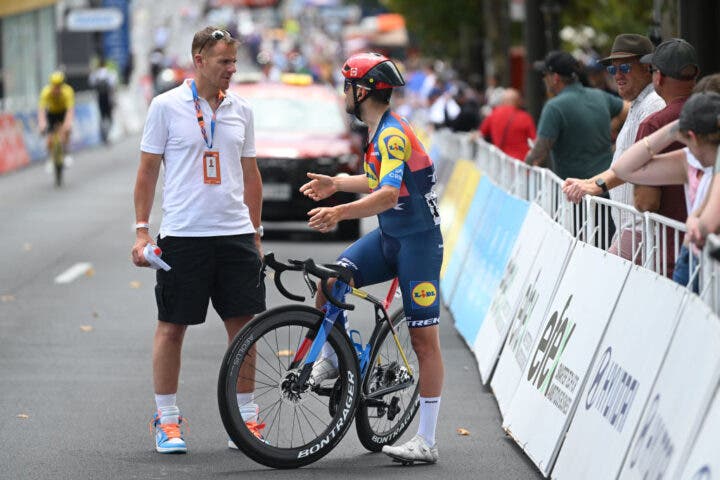 Adam Hansen is emerging as a strong advocate for the riders. (Photo: Dario Belingheri/Getty Images)
Adam Hansen is emerging as a strong advocate for the riders. (Photo: Dario Belingheri/Getty Images)
Adam Hansen, the president of the CPA riders’ union and a former Lotto rider, has emerged as the riders’ most prominent ally as the talks drag on.
Speaking to Sporza, he confirmed that 43 riders between Lotto and Intermarché currently hold contracts for 2026, yet the new combined team can register only 30 under UCI rules.
According to ProCyclingStats, 18 of those riders are already locked in from Lotto’s existing contracts, which means the numbers won’t add up.
“That’s a dream situation from the point of view of the new team. They can simply pick who they want to continue with and who they don’t,” Hansen told Sporza.
“But from the riders’ point of view, it’s completely unfair. They’re being held hostage by this situation. As long as they have an active contract, they can’t leave the team. So they just have to wait until there’s news.”
Belgian labor law gives teams the upper hand
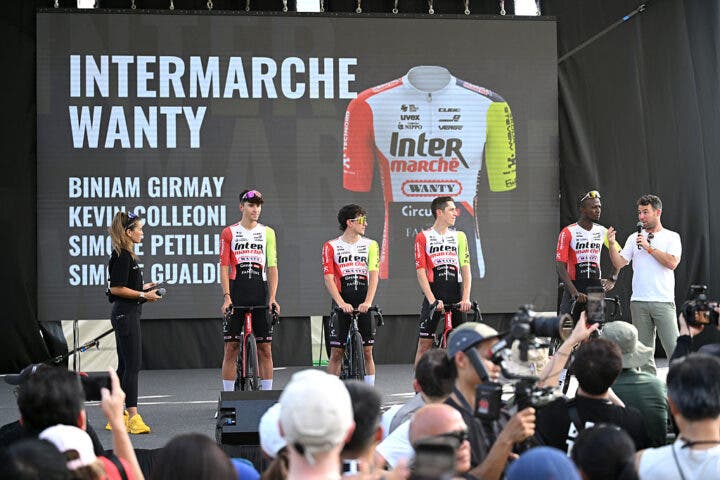 The merged outfits are expected to race under Lotto’s existing license. (Photo: Szymon Gruchalski/Getty Images)
The merged outfits are expected to race under Lotto’s existing license. (Photo: Szymon Gruchalski/Getty Images)
Hansen also pointed out that the UCI’s regulatory framework is all but powerless because Belgian labor law supersedes sporting regulations.
“Actually, the UCI has good regulations, but Belgian labor law goes above that,” Hansen said. “That law allows teams to wait even until December 31 to tell riders something.”
That means teams can legally keep riders hanging until the final hours of the transfer window, just as remaining spots across the wider peloton on other teams are shrinking by the day.
Riders are caught in the middle, and the fear is that dozens will be left out in the cold.
“If a rider is told in July or August that he’s not being kept and he doesn’t find a team, then that’s partly on him,” Hansen said. “But if he only hears that in October or November — as in this case — then the fault lies with the team. All the rosters are already full for 2026, and that’s not fair.”
In a sport with a relatively short professional timeline, dozens of highly talented, middle-of-the-pack pros could be left with nothing.
Where does Girmay land?
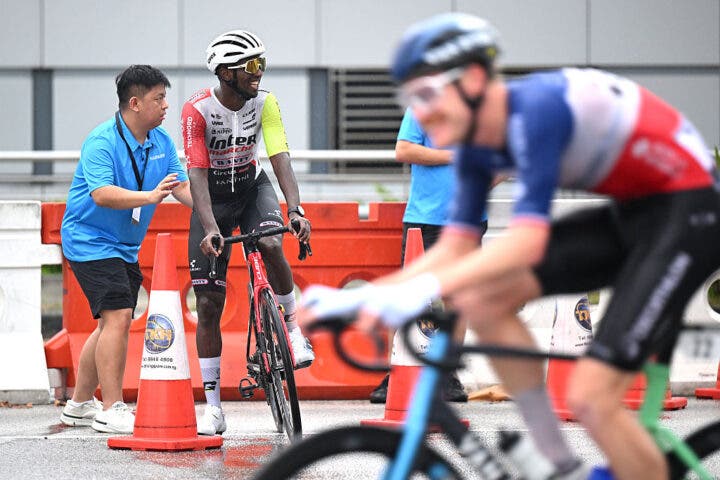 Girmay, shown here at the Singapore criterium, is the crown jewel of Intermarché. (Photo: Szymon Gruchalski/Getty Images)
Girmay, shown here at the Singapore criterium, is the crown jewel of Intermarché. (Photo: Szymon Gruchalski/Getty Images)
One key piece of the complex puzzle is the future of Intermarché sprinter ace Biniam Girmay, winner of the 2024 green jersey at the Tour de France.
The Eritrean sprinter star has been linked to other teams, including the soon-to-be rebranded Israel-Premier Tech, which is expected to bounce into the WorldTour next year.
Adding to the tumult, co-sponsor Premier Tech just announced Friday it would not continue backing the team. Sources told Velo on Friday that the sudden sponsor departure will not torpedo deals to sign riders for 2026 or impact existing contracts.
“A lot depends on Biniam Girmay. If he decides to stay with the fusion team, then there is one rider who still loses his job,” Hansen said.
Hansen said both teams are trying to keep as many riders on the leash as long as possible to build out the new roster, even if they know they won’t have room for all of them.
“I also know of a rider who was on the list to be deleted and who had found another team. Still, the merger team didn’t want to let him go, because they kept doubting whether they might not keep him after all,” Hansen said.
“That indicates that Lotto and Intermarché were not so honest with the UCI and us when they showed that list of dropouts,” Hansen said. “The teams can decide whether they want to keep a rider to their contract or not, but the rider cannot decide whether he wants to stay or not.”
Mergers are nothing new, but there is always pain
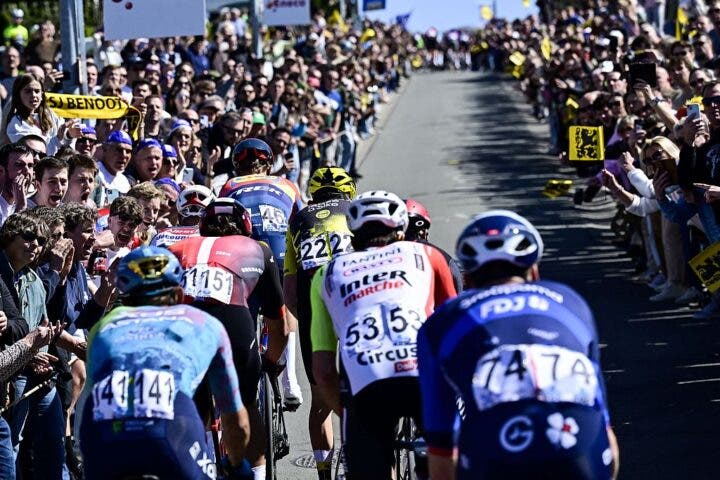 Merger talks are the latest in a long line of consolidation deals. (Photo: DIRK WAEM/Belga/AFP via Getty Images)
Merger talks are the latest in a long line of consolidation deals. (Photo: DIRK WAEM/Belga/AFP via Getty Images)
Team mergers in the men’s WorldTour are nothing new.
The sport’s history is littered with sponsor mashups and last-minute rescues, and the results rarely leave everyone happy.
Teams and organizations like to build and maintain a certain style or tradition, so there’s often a winner and loser in these mergers as one team’s identity (and staff) is swallowed by another.
The most recent blockbuster near-miss came in 2023, when then-Jumbo-Visma and Soudal Quick-Step nearly combined into a super team in a play for Remco Evenepoel before talks collapsed.
In 2018, BMC’s exit led Polish sponsor CCC to absorb its license and riders like Greg Van Avermaet. In 2010, Garmin-Sharp merged with Cérvelo to form what would eventually become EF Education-EasyPost.
And in 2011, RadioShack combined with Leopard Trek to create RadioShack-Nissan-Trek, a team that is Lidl-Trek with a majority stake ownership with the German superstore Lidl.
Often at play is a team’s WorldTour license. When Israel-Premier Tech bought Katusha’s license in 2019, the Russian-backed operation vanished overnight.
Sometimes a license cannot save an organization. Qhubeka NextHash folded in 2022 after new sponsors could not be secured despite having a confirmed spot in the WorldTour. That team’s since been reborn as Q36.5 Pro Cycling and is now applying for a WorldTour license going into 2026.
And it’s not just riders who are squeezed.
Behind every merger lies an equally important scramble among sport directors, mechanics, coaches, and soigneurs, as teams trim duplicate roles.
Critics say this constant churn and uncertainty are the symptoms of a business model that no longer works for modern cycling.

